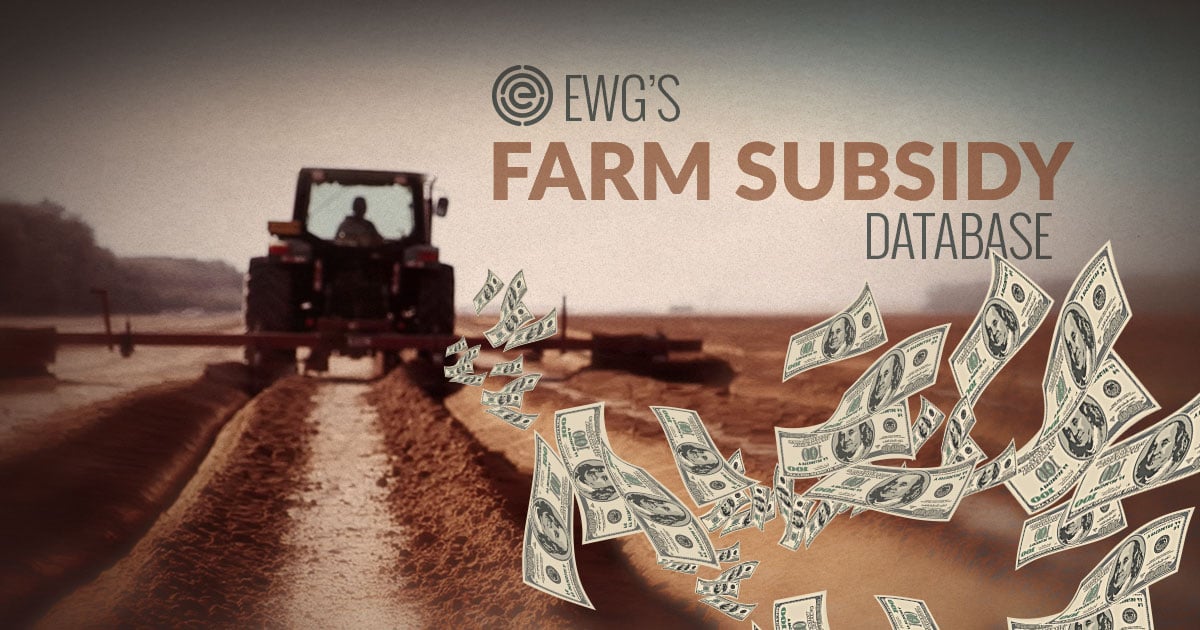Hello my Vegan freinds, I'm interesting in knowing if you think that America could sustain a population that only ate vegan food? this got me thinking about how gentrification plays a role in having access to healthy options...in different places. Do you have nearby food sources to buy your likes?
You are using an out of date browser. It may not display this or other websites correctly.
You should upgrade or use an alternative browser.
You should upgrade or use an alternative browser.
Accessibility
- Thread starter JM1
- Start date
After a ton of changes in food subsidies--and good luck with that!

 farm.ewg.org
farm.ewg.org
I mean, yes, it's not only possible, but the only real practical solution to both hunger and climate controls. We have the ability to grow right in urban centers, in high rise green houses, and roof tops. Schools used to have gardens that the children worked in, that were incorporated in classroom learning. Farms can be anywhere.
Now of course the reality has nothing to do with whats best, or what makes sense. The reality is that it does make sense and not lining the pockets of the wealthy that use food as control

EWG's Farm Subsidy Database
EWG's Farm Subsidy Database put the issue on the map and is driving reform. Just ten percent of America's largest and richest farms collect almost three-fourths of federal farm subsidies; cash payments that often harm the environment.
I mean, yes, it's not only possible, but the only real practical solution to both hunger and climate controls. We have the ability to grow right in urban centers, in high rise green houses, and roof tops. Schools used to have gardens that the children worked in, that were incorporated in classroom learning. Farms can be anywhere.
Now of course the reality has nothing to do with whats best, or what makes sense. The reality is that it does make sense and not lining the pockets of the wealthy that use food as control
Lou
Forum Legend
The anti-vegan/pro-meat people often cite studies that say veganism is not sustainable.
I've read some of those studies and IMHO its hogwash.
No matter what metric you wish to study: GHG, water use, land use, energy use - vegan foods are more sustainable.
The one thing that these studies rely on is that not all land that can sustain livestock is arable. This might be important in places like Africa. But here in the US most livestock just eat crops. The same crops we eat.
If you do the math, going vegan creates more food. So much more food that you don't need as much land as we use today and you can allow for more parks and reforestation, too.
As far as accessibility goes. It basically just depends on demand. I don't think supply is really a factor.
And as @silva mentioned, food subsidies are a big factor. If you take the subsidies out of the picture the price of milk and meat goes up. Once a gallon of milk costs more than a gallon of soy milk. or a pound of beef costs more than a pound of Beyond meat, you will see people less interested in buying meat and milk.
I've read some of those studies and IMHO its hogwash.
No matter what metric you wish to study: GHG, water use, land use, energy use - vegan foods are more sustainable.
The one thing that these studies rely on is that not all land that can sustain livestock is arable. This might be important in places like Africa. But here in the US most livestock just eat crops. The same crops we eat.
If you do the math, going vegan creates more food. So much more food that you don't need as much land as we use today and you can allow for more parks and reforestation, too.
As far as accessibility goes. It basically just depends on demand. I don't think supply is really a factor.
And as @silva mentioned, food subsidies are a big factor. If you take the subsidies out of the picture the price of milk and meat goes up. Once a gallon of milk costs more than a gallon of soy milk. or a pound of beef costs more than a pound of Beyond meat, you will see people less interested in buying meat and milk.
Last edited:
That makes a lot of sense and I'm sure there's more vegans that support taking care of our environment as you stated aboveAfter a ton of changes in food subsidies--and good luck with that!

EWG's Farm Subsidy Database
EWG's Farm Subsidy Database put the issue on the map and is driving reform. Just ten percent of America's largest and richest farms collect almost three-fourths of federal farm subsidies; cash payments that often harm the environment.farm.ewg.org
I mean, yes, it's not only possible, but the only real practical solution to both hunger and climate controls. We have the ability to grow right in urban centers, in high rise green houses, and roof tops. Schools used to have gardens that the children worked in, that were incorporated in classroom learning. Farms can be anywhere.
Now of course the reality has nothing to do with whats best, or what makes sense. The reality is that it does make sense and not lining the pockets of the wealthy that use food as control
I greed... Are you from the west coast?The anti-vegan/pro-meat people often cite studies that say veganism is not sustainable.
I've read some of those studies and IMHO its hogwash.
No matter what metric you wish to study: GHG, water use, land use, energy use - vegan foods are more sustainable.
The one thing that these studies rely on is that not all land that can sustain livestock is arable. This might be important in places like Africa. But here in the US most livestock just eat crops. The same crops we eat.
If you do the math, going vegan creates more food. So much more food that you don't need as much land as we use today and you can allow for more parks and reforestation, too.
As far as accessibility goes. It basically just depends on demand. I don't think supply is really a factor.
And as @silva mentioned, food subsidies are a big factor. If you take the subsidies out of the picture the price of milk and meat goes up. Once a gallon of milk costs more than a gallon of soy milk. or a pound of beef costs more than a pound of Beyond meat, you will see people less interested in buying meat and milk.
Lou
Forum Legend
Jamie in Chile
Forum Legend
- Joined
- Jan 3, 2016
- Reaction score
- 1,997
- Age
- 45
- Lifestyle
- Vegetarian
It is actually easier to sustain a population that ate vegan food because there would be a lot of land used for grazing and growing crops for animals that could be used for something else. You would also get reduced climate change, less polluted water, less damaged soil and so on.
Awesome, it looks beautiful on TV... Do you have nearby access to local markets or grocery stores?I live there now.
Lou
Forum Legend
There is a little grocery store - I think it fits into the bodega category a block away.Awesome, it looks beautiful on TV... Do you have nearby access to local markets or grocery stores?
A Trader Joe's a 5 minute walk.
A Molly Stone's is 15 minutes walk. Molly's is a upscale market.
I have 3 Safeways within a 10 minute drive. Safeway is a big supermarket chain.
I can even walk to a Whole Foods. but I rarely do.
There are two farmer markets within waking distance. One on Tuesday and one on Sunday and two more that are 20 minute drives. But both are on Sunday so I rarely go to them.
Before the Pandemic I rarely went to the supermarket. but during lockdown, the supermarket had curbside pickup and that is all I did. It forced me into a higher level of meal planning. Now that I'm in the habit - I make one supermarket trip a week. but I still walk to the other stores on a regular basis.
San Mateo is a food oasis.

THE BEST 10 Grocery in SAN MATEO, CA - Last Updated May 2024 - Yelp
Best Grocery in San Mateo, CA - Safeway, Draeger's Market, Takahashi Market, Crystal Springs Produce, Piazza's Fine Foods, Trader Joe's, Dean's Produce, Byrd's Filling Station, Mi Rancho Supermarket, Whole Foods Market
I just re-read the original post. I'm sorry. I thought this was about the sustainability of vegan food - not the availability.
With all these store I can get just about anything I want. Although since the pandemic sometimes its hard to find soy milk. In fact, for a while I started ordering soy milk from Amazon in redi-pacs, so I would always have a back up when the stores ran out.
In fact, I think availability shouldn't really be an issue no matter where you live. Although I've heard there are places you can't get fresh fruits and veggies - there are always canned and frozen.
You can see some of the pictures I take on my hikes in the Random Pictures thread.
Chryssie
Internet Junkie
I live in a small (35,000) town in Central Florida between Orlando and Daytona Beach. I have no trouble accessing any kind of food I want. The regional chain supermarket, Publix, has a very large offering of vegan/vegetarian frozen foods. Even Walmart has a really good selection. There is a Neighborhood Walmart only a block from me but my preferred store is Publix which is right by my work and only about 2 miles from me. The closest Whole Foods or Trader Joe's are in Orlando where I will not go. There are farmer's markets all the time, every Friday evening downtown, and a big one at the fairgrounds on Wednesdays. No problem at all obtaining food around here!
It's a blessing to have so many options. I may write about gentrification for my anthropology assignment... Would you say that you live in a white neighborhood and that you are Caucasian as well???There is a little grocery store - I think it fits into the bodega category a block away.
A Trader Joe's a 5 minute walk.
A Molly Stone's is 15 minutes walk. Molly's is a upscale market.
I have 3 Safeways within a 10 minute drive. Safeway is a big supermarket chain.
I can even walk to a Whole Foods. but I rarely do.
There are two farmer markets within waking distance. One on Tuesday and one on Sunday and two more that are 20 minute drives. But both are on Sunday so I rarely go to them.
Before the Pandemic I rarely went to the supermarket. but during lockdown, the supermarket had curbside pickup and that is all I did. It forced me into a higher level of meal planning. Now that I'm in the habit - I make one supermarket trip a week. but I still walk to the other stores on a regular basis.
San Mateo is a food oasis.

THE BEST 10 Grocery in SAN MATEO, CA - Last Updated May 2024 - Yelp
Best Grocery in San Mateo, CA - Safeway, Draeger's Market, Takahashi Market, Crystal Springs Produce, Piazza's Fine Foods, Trader Joe's, Dean's Produce, Byrd's Filling Station, Mi Rancho Supermarket, Whole Foods Marketwww.yelp.com
I just re-read the original post. I'm sorry. I thought this was about the sustainability of vegan food - not the availability.
With all these store I can get just about anything I want. Although since the pandemic sometimes its hard to find soy milk. In fact, for a while I started ordering soy milk from Amazon in redi-pacs, so I would always have a back up when the stores ran out.
In fact, I think availability shouldn't really be an issue no matter where you live. Although I've heard there are places you can't get fresh fruits and veggies - there are always canned and frozen.
You can see some of the pictures I take on my hikes in the Random Pictures thread.
Lou
Forum Legend
I'm Caucasian. I live in an apartment. Most everyone in my apartment is Not white. The nearby elementary shool is very heterogenous. Almost 80% non white.It's a blessing to have so many options. I may write about gentrification for my anthropology assignment... Would you say that you live in a white neighborhood and that you are Caucasian as well???
I wouldn't describe my neighborhood gentrified. We do have some new developments in the area but a lot of t the area is solidly middle class single family homes. but there is a good percentage of apartments.
As usual, I'm very grateful for your transparancy and all the knowledge that you shared with me.. Have a blesses night and God willing we'll talk more tomorrowI'm Caucasian. I live in an apartment. Most everyone in my apartment is Not white. The nearby elementary shool is very heterogenous. Almost 80% non white.
I wouldn't describe my neighborhood gentrified. We do have some new developments in the area but a lot of t the area is solidly middle class single family homes. but there is a good percentage of apartments.



